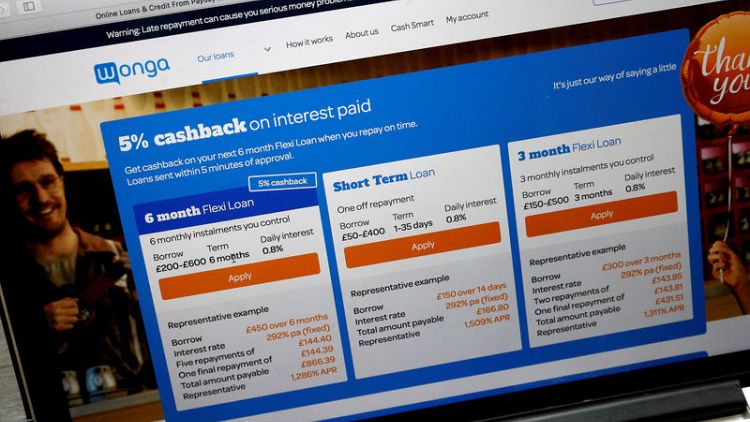By Emma Rumney
LONDON (Reuters) - The collapse of Britain's biggest payday lender Wonga is likely to turn up the heat on its rivals amid a surge in grievances by customers and calls by some politicians for tighter regulation. Britain's poster child of short-term, high-interest loans collapsed into administration on Thursday, only weeks after raising 10 million pounds to help it cope with an increase in compensation claims.
Wonga said the surge in claims was driven by so-called claims management companies, firms that help consumers win compensation from businesses. Wonga had already been struggling following the introduction by regulators in 2015 of a cap on the interest it and others in the industry could charge on loans.
Allegiant Finance Services, a claims management company focussed on payday lending, has seen an increase in business in the past two weeks due to media reports about Wonga's financial woes, its managing director, Jemma Marshall, told Reuters.
Wonga claims make up around 20 percent of Allegiant's business today, she said, adding she expects the industry's attention to turn to its rivals after Wonga's demise.
One of the biggest boons for the claims management industry has been mis-sold payment protection insurance (PPI) - Britain's costliest banking scandal that has seen UK lenders pay out billions of pounds in compensation.
But a cap on the fees claims management firms can charge in PPI complaints and an approaching August 2019 deadline to submit those claims have driven many to shift their focus towards payday loans, Marshall said.
"This is just the starting gun for mis-sold credit, and it will define the landscape after PPI," she said, adding her company was planning to start managing claims on automatic credit card limit increases and doorstep loans.
The Consumer Finance Association, a trade group representing short-term lenders, said claims management companies were using "some worrying tactics" to win business "that are not always in the best interest of customers."
"The collapse of a company does not help people that want to access credit or those that believe they have grounds for a complaint," it said in a statement.
COMPLAINTS INCREASE
Wonga is not the only payday lender to be hit by an increase in complaints since 2015. https://tmsnrt.rs/2LIfbKa
Britain's Financial Ombudsman Service, which settles disputes between consumers and financial firms, received 10,979 complaints against payday lenders in the first quarter of this year, a 251 percent increase on the same period last year.
Casheuronet UK LLC, another large payday lender in Britain that is owned by U.S. firm Enova International Inc <ENVA.N> and operates brands including QuickQuid and Pounds to Pocket, has also seen a significant increase in complaints since 2015.
Data published by the firm and the Financial Conduct Authority show the number of complaints it received rose from 9,238 in 2015 to 17,712 a year later and 21,485 in the first half of this year. Wonga said on its website it received 24,814 grievances in the first six months of 2018.
In its second-quarter results filing, published in July, Enova International said the rise in complaints had resulted in significant costs, and could have a "material adverse affect" on its business if it continued.
Labour lawmaker Stella Creasy this week called for the interest rate cap to be extended to all forms of credit, calling companies like guarantor loan firm Amigo Holdings <AMGO.L> and Provident Financial <PFG.L> "legal loan sharks".
Glen Crawford, CEO of Amigo, said its customers aren't financially vulnerable or over-indebted, and use their loans for considered purchases like buying a car.
"Amigo has been offering a responsible and affordable mid-cost credit product to people who have been turned away by banks since long before the payday market evolved," he said in a statement.
Provident declined to comment.
In a note on Friday, Fitch Ratings said the payday lending business model that grew rapidly in Britain after the global financial crisis "appears to be no longer viable". It expects lenders focussed on high-cost, unsecured lending to adapt their business models towards cheaper loans aimed at safer borrowers.
(Reporting by Emma Rumney; editing by David Evans)



